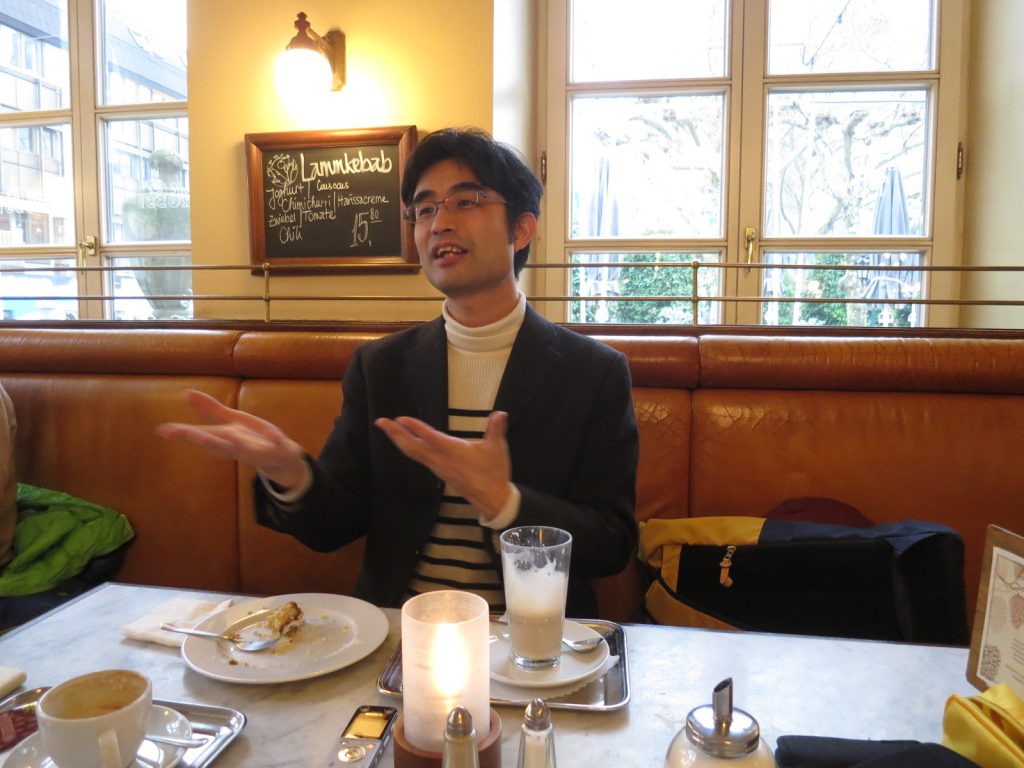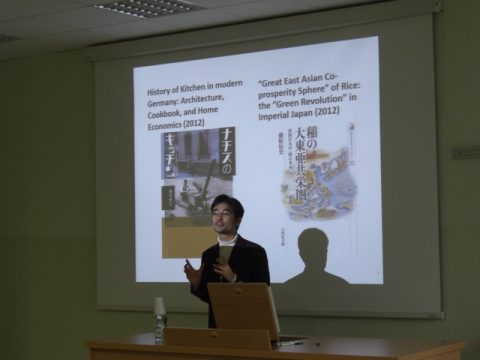Prof. Tatsushi Fujihara (Associate Professor at the Institute for Research in Humanities, Kyoto University)
Before his return to Japan after spending 3 month at Heidelberg University we met Prof. Tatsushi Fujihara (Associate Professor at the Institute for Research in Humanities, Kyoto University) to talk about his experience while staying and lecturing in Heidelberg.
| Our meeting took place at the famous Café Rossi, bustling at tea time. Prof. Fujihara began our conversation by talking about the “difficult, but enjoyable” seminars. The weekly seminar was held for students enrolled in the Master of Transcultural Studies (MATS) course at the Cluster of Excellence Asia and Europe in a Global Context and had a weekly duration of 4 hours (2 units a 2 hours). For him it seemed difficult to prepare the lessons for the about 15 students coming from diverse backgrounds like Germany, the U.S.A, China and Korea and explain Japanese food culture and terminology of modern Japanese history in English. But the 4 hours of lecture were fun because the students were arguing about the contents of English books on the history of Japanese food that had to be read. He even had to hide a smile because the exchange was so live. Prof. Fujihara pointed out that one of the differences to Japan is that students continue to discuss points with their classmates even if they are not led into the discussion. |
Prof. Fujihara, who participated in many research conferences, remarked that whereas Japanese students tend to become silent when a teacher in the audience is asking questions, the attitude of the students here was different because they were not caring about the professor being there at all. They were actively sharing their ideas while asking other students for their opinion. In a broader sense, he also got the impression that arrogant judgment (ue kara mesen no hihan) resonating in questions like “Isn’t the field you are talking about uncalled for? Isn’t it more important what I have to say?” or criticism within the field like “If you haven’t read this article or that book you can’t discuss this matter.” is scare.
|
Prof. Fujihara agrees that in this kind of exchange, language is an important factor, but he also clearly states that “enthusiasm and respect are more important.” Giving seminars and lectures in Heidelberg, the Belgian Leuven University and the Jagiellonian University in Kraków, Poland, about the global history of tractors, the history of tsukemono (Japanese pickled vegetables) and the nutrition situation in Germany in the First World War he was able to exchange ideas with different audiences. The reason he could have a good discussions with the audience was, that there was an “enthusiasm” between the speaker that wants to tell and the audience that wants to listen, and a mutual “repect” to each other. With a smile on his face Prof. Fujihara said: “While usually only maniacs say that the history of tractors is very interesting, here the audience listened with enthusiasm. Against my own expectations, I was treated very kindly and amiable.” |
At this point I asked him about what internationalization means to him. He answered: “internationalization is not the proliferation of English language. It is extremely important for humanities to respect the language of minorities. I myself lecture in English but lecturing in Germany in the dialect of my hometown in Izumo might have been more in the spirit of humanities.” Prof. Fujihara also admitted that he didn’t take this perspective into consideration about internationalization much. Breaking through the scientific seclusion in Japan is more important.
Prof. Fujihara gave a talk about his way of thinking. “I would never think to contact world leading authorities in the field of food history to start with. In my eyes this is not internationalization. I will give you an idea. I would rather initiate a regular meeting with Japanese researchers first, and might also invite Japanese researchers studying Africa, for example. These in turn might invite African researchers. Unless the last steps are taken, global exchange stops right away. If I only had the enthusiasm to just send my papers to researchers directly when I get their E-mail addresses. Through this, exchange could be built. I wish that this would lead to joint organized panels at international conferences. And then, for the next step financial support by our universities would be necessary to enable joint projects that can deliberately concentrate on research. Isn’t it more important for the internationalization of research to provide with financial infrastructures in order to enable such kind of close relationships with foreign researchers at the right time and in accordance with the circumstances?”
“I want to view my field of research from a much broader point of view. Isn’t my desire to not become secluded a natural sign of internationalization?” These words left a deep impression. Internationalization not just as an aim, but a mean. A result. “The students told me the motto of Heidelberg University and I totally like it. It’s Semper Apertus and means ‘always open’. Internationalization has to start with breaking through the seclusion of knowledge.” He also said that the existence of the Kyoto University European Center has given him great psychological support. Again I was reflecting on what we as a liaison office and especially we as University Research Administrators at the office could do in order to help to overcome this wall. What we need on our side is also “enthusiasm and respect” toward research and researchers. The meeting with Prof. Fujihara reaffirmed this sense of confidence.




